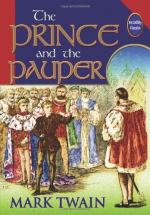’Bien Darkman’s then, Bouse Mort and Ken, The bien Coves bings awast, On Chates to trine by Rome Coves dine For his long lib at last. Bing’d out bien Morts and toure, and toure, Bing out of the Rome vile bine, And toure the Cove that cloy’d your duds, Upon the Chates to trine.’ (From ‘The English Rogue.’ London, 1665.)
Conversation followed; not in the thieves’ dialect of the song, for that was only used in talk when unfriendly ears might be listening. In the course of it, it appeared that ‘John Hobbs’ was not altogether a new recruit, but had trained in the gang at some former time. His later history was called for, and when he said he had ‘accidentally’ killed a man, considerable satisfaction was expressed; when he added that the man was a priest, he was roundly applauded, and had to take a drink with everybody. Old acquaintances welcomed him joyously, and new ones were proud to shake him by the hand. He was asked why he had ’tarried away so many months.’ He answered—
“London is better than the country, and safer, these late years, the laws be so bitter and so diligently enforced. An’ I had not had that accident, I had stayed there. I had resolved to stay, and never more venture country-wards—but the accident has ended that.”
He inquired how many persons the gang numbered now. The ‘ruffler,’ or chief, answered—
“Five and twenty sturdy budges, bulks, files, clapperdogeons and maunders, counting the dells and doxies and other morts. {7} Most are here, the rest are wandering eastward, along the winter lay. We follow at dawn.”
“I do not see the Wen among the honest folk about me. Where may he be?”
“Poor lad, his diet is brimstone, now, and over hot for a delicate taste. He was killed in a brawl, somewhere about midsummer.”
“I sorrow to hear that; the Wen was a capable man, and brave.”
“That was he, truly. Black Bess, his dell, is of us yet, but absent on the eastward tramp; a fine lass, of nice ways and orderly conduct, none ever seeing her drunk above four days in the seven.”
“She was ever strict—I remember it well—a goodly wench and worthy all commendation. Her mother was more free and less particular; a troublesome and ugly-tempered beldame, but furnished with a wit above the common.”
“We lost her through it. Her gift of palmistry and other sorts of fortune-telling begot for her at last a witch’s name and fame. The law roasted her to death at a slow fire. It did touch me to a sort of tenderness to see the gallant way she met her lot—cursing and reviling all the crowd that gaped and gazed around her, whilst the flames licked upward toward her face and catched her thin locks and crackled about her old gray head—cursing them! why an’ thou should’st live a thousand years thoud’st never hear so masterful a cursing. Alack, her art died with her. There be base and weakling imitations left, but no true blasphemy.”




